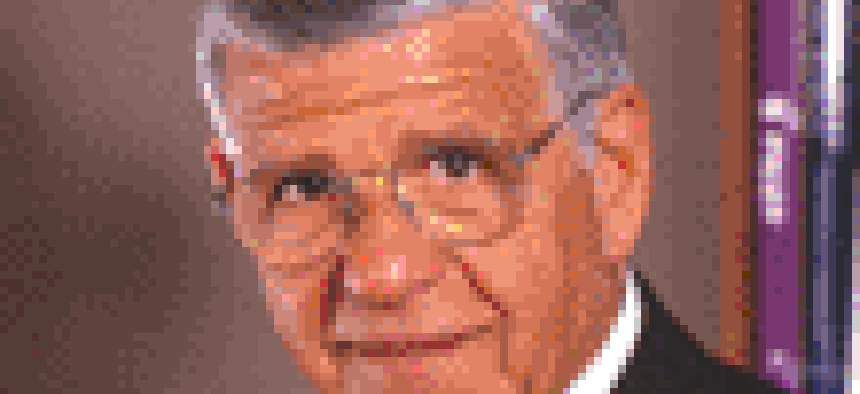Survival Guide: Ron Shaw, president and chief executive officer of Pilot Pen Corp.

Ron Shaw, president and chief executive officer of Pilot Pen Corp. of America in Trumbull, Conn., started in stand-up comedy. He toured nationally, opening for the likes of Dean Martin, Liberace and Connie Frances. But when Shaw's wife became pregnant in 1961, he got a sales job at BIC Pen. In 1975 he joined Pilot Pen, and 11 years later became president. Since 1975, the company has grown from $1 million to nearly $200 million in annual revenue. Shaw, author of the motivational book," Pilot Your Life," discussed comedy and business with Staff Writer Gail Repsher Emery.
Ron Shaw, president and chief executive officer of Pilot Pen Corp. of America in Trumbull, Conn., started in stand-up comedy. He toured nationally, opening for the likes of Dean Martin, Liberace and Connie Frances. But when Shaw's wife became pregnant in 1961, he got a sales job at BIC Pen. In 1975 he joined Pilot Pen, and 11 years later became president. Since 1975, the company has grown from $1 million to nearly $200 million in annual revenue. Shaw, author of the motivational book," Pilot Your Life," discussed comedy and business with Staff Writer Gail Repsher Emery.Shaw: One of the biggest lessons I learned was how to read people. You do jokes 1, 2 and 3, you know the laughter they usually get, and for whatever reason it's not working. You've got to react very quickly and make it very natural. The audience can never know you decided to get away from what you planned. Reading people from the stage is difficult, because you normally can't see the audience. You have to read them by reaction to the material. When you're in a boardroom, you've got to be able to listen, read people and react accordingly. I learned those things as I grew up on the stage. When you go out on the stage to do your jokes, your report card is the applause and laughs you get. You have to sell yourself. In the pen business, I still had to go out and sell myself first. The whole idea is to make yourself liked and yet not be a pushover. That delicate balance I learned as a performer. Shaw: We had to make some changes in personnel recently. That's a very distasteful thing for me. I was meeting with the top guys who report to me. It was getting tense. I said a few things intended to be humorous and get everybody calmed down. It's not the old Ronnie Shaw that was on the stage telling jokes. It's the Ron Shaw who proves he has not lost his sense of humor. You just have to know where it belongs and where it doesn't, and use it where it can do some good.Shaw: They are probably equal. Being a good comedian is not easy. The big-name comedians are rather serious people until they walk out on stage, and all of a sudden they become very funny. Doing what I do now is also very difficult. There is one president, one CEO of the company, and everybody is aspiring for that job. Once you get there, it's probably more difficult to stay than it was to get there. Shaw: Trusting your instincts and not being afraid to take a risk. As a performer, if somebody sneezed six times in a row, all of a sudden you've got a quick line in your head, and you have a millisecond to try it. Don't be afraid to try it. In business, whether it's a new ad campaign or a wacky name for a pen, take the risk and do it. Try not to be rude, but don't listen to experts, such as the executive at BIC who told me I wouldn't last a year [at Pilot] because I wouldn't be able to make a brand out of Pilot Pen. That's all I needed to hear. Today, we are the third biggest pen company in America and a very big brand name.Shaw: When I started with Pilot in 1975, some people didn't like that we were owned by a Japanese company. We were accused of destroying American jobs. I had to explain that we were building market share by importing, and once we had enough market share we would start making the pens here. In 1995, we opened a factory in Jacksonville, Fla. The place has been expanded twice. Every one of our 301 employees is an American. When I came to this company we employed nine people in the United States. To create more jobs, we had to import product. Is it any different than going in front of a tough audience? It was just as uncomfortable. But we had to do that to get Pilot Pen where it is today.

WT: How are comedy and business alike?
WT: When is humor in the workplace good, and when is it bad?
WT: Which is harder work, being a comedian or being a CEO?
WT: What skills did you learn from stand-up that you could apply to business leadership?
WT: Has the United States ever been a hostile market? Was that like dealing with a hostile crowd while on stage?

Ron Shaw, president and chief executive officer of Pilot Pen Corp. of America
WT: How are comedy and business alike?
WT: When is humor in the workplace good, and when is it bad?
WT: Which is harder work, being a comedian or being a CEO?
WT: What skills did you learn from stand-up that you could apply to business leadership?
WT: Has the United States ever been a hostile market? Was that like dealing with a hostile crowd while on stage?

